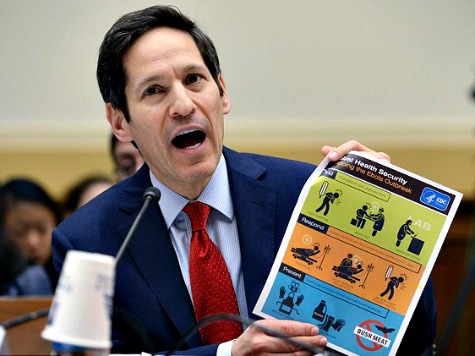
On his blog on the website of the Centers for Disease Control and Prevention (CDC), director Dr. Tom Frieden wrote that sealing borders, restricting travel to and from countries with widespread cases of Ebola, and otherwise isolating communities infected with the deadly disease “increases people’s distrust of government, making them less likely to co-operate to help stop the spread of Ebola.”
Frieden added:
I have been asked whether we should stop travel to Liberia. The answer is no: to keep Americans and people in non-affected countries safe, we must continue to work to support efforts to stop the spread of Ebola in Liberia, Guinea and Sierra Leone. One strategy that won’t stop this epidemic is isolating affecting countries or sealing borders. When countries are isolated, it is harder to get medical supplies and personnel deployed to stop the spread of Ebola. And even when governments restrict travel and trade, people in affected countries still find a way to move and it is even harder to track them systematically.
Frieden continued that restricting travel to and from a community with widespread Ebola would make it more difficult to control the isolated area and would place that country at even greater risk.
“At the United Nations last week, delegates wore buttons that said: Isolate patients, not countries,” Frieden wrote. “The only way to stop the epidemic is to isolate and care for patients, not to quarantine entire communities, areas, or countries. Patients, communities, and countries that are fighting Ebola need our support.”
A guest on NBC’s Meet the Press on Sunday, Frieden also said that experimental drugs may help with the spread of Ebola, but added, “The drug pipeline is going to be slow, I’m afraid.”
The CDC director said, however, that he understands that people are afraid because Ebola is a “deadly virus” that moves “very, very fast.”
“The most promising drug, ZMapp, there’s no more of it, and it’s hard to make, it takes months to make just a bit,” Frieden said.
“The bottom line here is we know how to stop it, it’s not going to spread widely in the U.S. for two basic reasons,” he continued. “We can do infection control in hospitals, and we can do public health interventions that can stop it in its tracks.”
As Breitbart News reported Saturday, however, Dr. Jane Orient, executive director of the Association of American Physicians and Surgeons, wrote on the AAPS website that the U.S. has already experienced a number of breaches in its defense against the spread of Ebola, first and foremost the fact that the hospital treating the symptomatic patient from Liberia failed to follow federal guidelines. Rather than being placed in isolation, the patient was sent home with antibiotics which, Orient said, “are useless for viral infections.”
The patient then vomited outside his apartment before being returned to the hospital by ambulance, but no precautions were taken in cleaning up the vomit, and no special care was taken in transporting him in the ambulance, she added.
“Even now, the patient is being treated under BSL-2 (biosafety level 2) conditions, although the World Health Organization states that BSL-4 precautions are needed for working with Ebola virus,” Orient continued. “Rules requiring international passengers to fill out a detailed health questionnaire have not been implemented, although the CDC called them ‘critical to protecting Americans from dangerous diseases spread by travelers’–in 2006.”
As CNSNews.com reports, on Sunday Dr. Anthony Fauci, head of the National Institute of Allergy and Infectious Diseases, repeated Frieden’s warning that sealing borders or restricting travel would lead to government instability.
Fauci told Chris Wallace of Fox News that the United States should “absolutely not” suspend flights to and from Ebola-infected areas of Africa, as British Airlines has done, nor impose a visa ban on individuals coming from the three African nations affected.
“No, in my opinion absolutely not,” Fauci responded. “Because when you start closing off countries like that, there’s a real danger of making things worse. You isolate them. You can cause unrest in the country. It’s conceivable that governments could fall if you isolate them completely.”

COMMENTS
Please let us know if you're having issues with commenting.